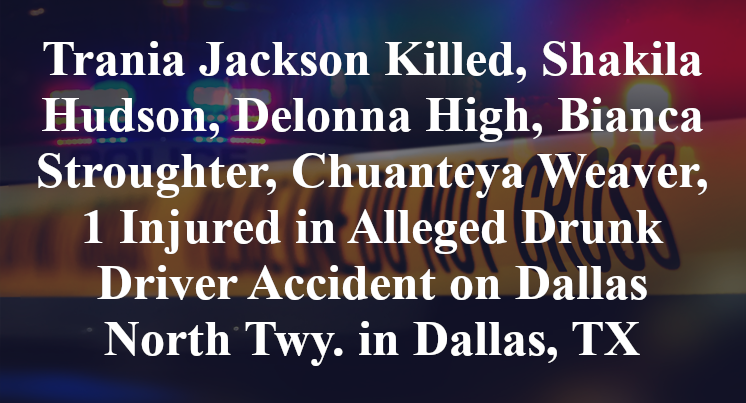Trania Jackson Killed, Shakila Hudson, Delonna High, Bianca Stroughter, Chuanteya Weaver, 1 Injured in Alleged Drunk Driver Accident on Dallas North Twy. in Dallas, TX
UPDATE (May 28, 2025): Additional reports have been released which state that the driver of the wrong-way vehicle was allegedly under the influence of alcohol at the time of the wreck. Further details are not available at this time. The investigation remains ongoing.
UPDATE (May 14, 2025): Recent reports have been released which clarify some of the details concerning this accident. According to those reports, 28-year-old Trania Jackson, of Cedar Hill—a passenger in the Nissan Altima—was the person who lost her life as a result of this accident. Four other people who had been in the Nissan with Jackson—31-year-old Shakila Hudson, 34-year-old Delonna High, 32-year-old Bianca Stroughter, and 24-year-old Chuanteya Weaver—were seriously injured. The 50-year-old man who had been behind the wheel of the wrong-way vehicle also suffered serious injuries. No additional details pertaining to this incident are currently available. Investigations continue.
Dallas, TX — May 12, 2025, one person was killed and five others were injured in a wrong-way car accident on the Dallas North Tollway.
According to authorities, a passenger vehicle was traveling northbound in the southbound lanes of Dallas North Tollway in the vicinity north of Royal Lane when the accident took place.

Officials indicate that there was a sideswipe collision between the wrong-way vehicle and a southbound 18-wheeler before the wrong-way vehicle crashed head-on with a southbound passenger vehicle.
Preliminary reports state that one person was killed due to the wreck while five others suffered critical injuries and were transported to local medical facilities by EMS for immediate treatment. Additional details pertaining to this incident—including the identities of the victims—are not available at this point in time. The investigation is currently ongoing.
Commentary by Attorney Michael Grossman
When I see reports of a wrong-way crash on a major highway, especially one as busy as the Dallas North Tollway, my first reaction is to wonder what could have led to such a dangerous and disorienting maneuver. Now, with updated reports suggesting the wrong-way driver may have been under the influence of alcohol, we’re faced with a heartbreaking and all-too-familiar possibility: that someone’s decision to drive drunk cost another person their life and left several others seriously injured.
If alcohol was indeed a factor, the natural next question is: Where was the driver drinking before getting behind the wheel? That’s not just a rhetorical point—it’s a vital part of the accountability process. In Texas, bars, restaurants, and other alcohol-serving businesses have a legal responsibility not to overserve someone who’s clearly intoxicated. When they fail in that duty, and a crash like this follows, the law gives victims and families a path to pursue justice. It’s called dram shop law, and it exists precisely for moments like this—when overservice may have contributed to the unimaginable.
Unfortunately, this part of the story often doesn’t get the attention it deserves. Most people don’t know to ask about where the drinking occurred or whether a licensed alcohol provider played a role. And unless someone steps in to investigate, that critical thread of responsibility may never be pulled. That’s why it's so important to look at the bigger picture. It’s not just about what happened on the tollway—but about the decisions and possible oversights that set this in motion before anyone ever got into a car.
At the end of the day, understanding how and why something like this happened is not just a matter of assigning blame. It’s about making sure that everyone—from drivers to alcohol providers—is held to the standard of care our laws demand. That’s the only way we reduce the risk of this happening again.
Three key takeaways:
A full investigation should look beyond the crash itself to include where the wrong-way driver had been drinking, and whether an alcohol provider contributed to the chain of events.
If alcohol was involved, the question of where the driver was drinking becomes critical—Texas law may hold providers responsible for serving an obviously intoxicated person.
Dram shop law is designed to uncover and address this kind of hidden liability, giving victims and families options many never realize they have.

“These are essential reads for anyone dealing with the aftermath of a truck wreck”– Attorney Cory Carlson